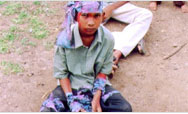 |
National Capacity Development and National Governance
In 2005, Iraqis completed two successful nationwide elections and a national constitutional referendum. Each successive election experienced less violence, bigger voter turnout, and broader political participation. On December 15, more than 11 million people - more than 75 percent of the Iraqi voting-age population - participated in the election for a new government under Iraq's new constitution, an increase of more than three million voters over the January election. Iraq's new permanent constitution, approved on October 15, 2005, provides a solid legal framework, based on a democratic process and inclusiveness, which the Iraqi people are working to strengthen. Iraqi leaders have formed a national government. The December election resulted in a representative parliament and a national unity government, furthering the commitment of Iraqi leaders to democratic principles. USAID launched Its National Capacity Development Program in September 2006 to bolster the capacity of mid- and senior-level management in the ten Iraqi ministries of: Planning and Development Cooperation, Finance, Oil, Electricity, Municipalities and Public Works, Water Resources, Health, Education, Justice, and Agriculture.
National Capacity Deployment Program (called Tatweer): Implemented through Management Systems International (MSI), Tatweer (which means development in Arabic) will act as a catalyst to foster a professional and competent civil service shaped by institutionalized, sustainable training systems that teach leadership and modern management skills throughout Iraqi public institutions. Tatweer is a three-year program with an award ceiling of $165 million. To date, USAID has received $65,000,000 ($5 million in reprogrammed IRRF and $60 million in FY 2006 Supplemental Funds (ESF). The broader National Capacity Development program of the USG is an inter-governmental agency effort - involving the United States Agency for International Development (USAID), the Department of State (DOS), and the Department of Defense (DOD). Each USG Agency will launch complementary projects and work in close cooperation with Iraq's Prime Minister's Office (PMO), the Council of Ministers Secretariat (COMSEC) and the Ministry of Planning. USAID launched Tatweer in September 2006 to bolster the capacity of mid- and senior-level management in the ten Iraqi ministries of: Planning and Development Cooperation, Finance, Oil, Electricity, Municipalities and Public Works, Water Resources, Health, Education, Justice, and Agriculture.
Tatweer's Early Accomplishments and Goals
- Tatweer began training ministry officials in November 2006 and now routinely offers introductory and advanced courses in: procurement competency and budget competency. In addition an anti-corruption annex is being offered. Through February 2007, 179 officials have been trained. New courses are now being developed in: budget process, cash management, project management and business English.
- Over the course of three years, Tatweer expects to train at total of 58,000 civil servants (5000 by June 2007, 8000 by December 2007, 25,000 in 2008, and 20,000 by late summer 2009).
- Tatweer is placing specialized technicians called Public Management Advisors (PMAs) in each of the ten ministries to provide hands-on assistance in day-to-day operations. As of March 2007, PMAs were placed in the ministries of electricity, oil, agriculture, and in the ministry of municipalities and public works.
- Tatweer will also provide training centers with a total of $9 million in grants to augment the national training program. Most grants will be issued for $100,000 or less.
- Tatweer includes a scholarship fund totaling $2 million to provide approximately 75 scholarships for Iraqis interested in studying public administration and related fields.
Support to the Iraqi Interim Government: USAID provided 13 technical experts to train the members of the Iraqi Transitional Government and the Iraqi National Assembly (INA) to professionalize government practices. The Executive Authority received training in developing a governing process, rules and procedures, and regulation, while the legislative branch was trained in lawmaking, representation, and executive oversight. All of the INA members and staff attended orientation sessions and training in areas such as parliamentary procedure to help them function as a professional legislative body. To educate voters about the significance of the constitution, USAID distributed 1.35 million pamphlets and supplements on the Constitution in both Arabic and Kurdish. USAID's 10,000 educational constitutional workshops reached over 300,000 people throughout Iraq including women and Sunni Arabs. Women and civic leaders were given the tools and training to advocate for their rights to be included in the Constitution.
Electoral Oversight and Voter Education: To ensure credible and transparent elections, USAID trained and transported thousands of Iraqis to guarantee citizen and civil society involvement in all of Iraq's transitional elections. These include the historic January 2005 National and Provincial Assembly elections, the October 2005 Constitutional Referendum and the December 2005 National Assembly elections. The program trained 15,000 political party observers and 10,000 accredited domestic monitors throughout Iraq. The Iraq without Violence network of NGOs, established by USAID, successfully monitored violence and mitigated election related conflict.
Electoral Technical Assistance: USAID awarded $41 million to provide technical and material support to the Independent Electoral Commission of Iraq (IECI) as it prepared for Iraq's ambitious series of transitional elections. The program worked with the United Nations to increase the staffing, skills, and capacity of the IECI and to create a nation-wide structure to administer voter registration and conduct the polling on Election Day. USAID provided extensive technical and logistical support to the IECI in developing and transporting their voter-education pamphlets throughout the country.
More Information:
Back to Top ^
|


